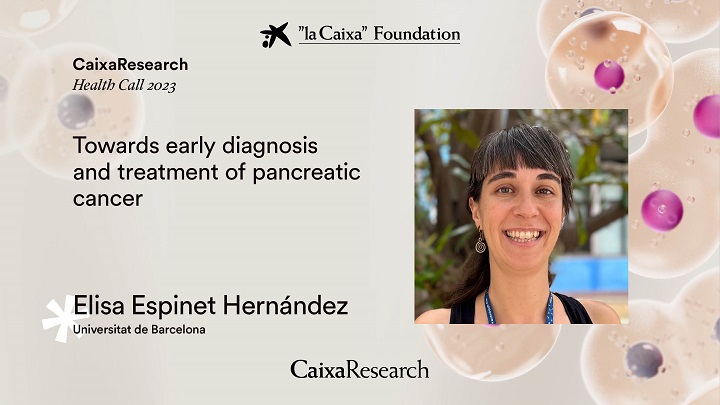Fighting the most aggressive pancreatic tumour

"Towards an early diagnosis and treatment of pancreatic cancer" is the title of the project led by the researcher Elisa Espinet, member of the Faculty of Medicine and Health Sciences of the University of Barcelona and the Bellvitge Biomedical Research Institute (IDIBELL), which will receive one of the grants of the sixth edition of the CaixaResearch call for research in health, promoted by the La Caixa Foundation. The call has funded with 25.3 million euros a total of 33 biomedical research projects of excellence with a high social impact in basic, clinical and translational research, to be carried out in research centres, hospitals and universities in Spain and Portugal.

"Towards an early diagnosis and treatment of pancreatic cancer" is the title of the project led by the researcher Elisa Espinet, member of the Faculty of Medicine and Health Sciences of the University of Barcelona and the Bellvitge Biomedical Research Institute (IDIBELL), which will receive one of the grants of the sixth edition of the CaixaResearch call for research in health, promoted by the La Caixa Foundation. The call has funded with 25.3 million euros a total of 33 biomedical research projects of excellence with a high social impact in basic, clinical and translational research, to be carried out in research centres, hospitals and universities in Spain and Portugal.
The project receives a funding amount of one million euros to work on the study of the role of pancreatic ductal cells in the development of the most aggressive pancreatic tumours. This initiative involves the participation of researchers Meritxell Rovira (UB-IDIBELL), co-director of the awarded project; Patricia Sancho (IIS Aragón - Fundación Instituto de Investigación Sanitaria Aragón), and Ana Rita Grosso (Nova University Lisbon and the Botton-Champalimaud Pancreatic Cancer Association).
The grants were awarded on Thursday 23 November at the CosmoCaixa Science Museum, in a ceremony in which the vice-rector for research of the UB, Jordi Garcia Fernández, was also present. This year, 493 projects were presented to the call, which has counted with the collaboration of the Foundation for Science and Technology (FCT) of Portugal, and the Luzón Foundation. The funded projects — 22 led by Spanish centres and 11 by Portuguese centres — will be carried out over the next three years.
Studying the cells in the pancreas that give rise to tumours
Pancreatic ductal adenocarcinoma (PDAC) is the most common type of pancreatic tumour and the cancer with the worst prognosis, with a five-year survival of less than 10%. There are still no early detection methods or effective treatments available. Moreover, this type of cancer is often diagnosed in advanced stages of the disease, making it difficult to remove in time by surgery, the only effective treatment available.
Previous studies in patient samples had identified a large heterogeneity among ADP tumours. The relationship between tumour heterogeneity and patient response to treatment has also been observed. However, it is not yet known how this heterogeneity is generated, which may stem in part from the cell of origin from which it is derived.
The team observed that not all ductal cells are the same, but that there are different populations with specific characteristics. Through animal models, the experts will study the development of the tumours that originate in different ductal cells, and this information will be integrated with data and cellular models of patients with ADP. This study, awarded in the CaixaResearch call, will help to determine the molecular mechanisms that underlay the development of heterogeneity in ADP tumours with the aim of identifying new biomarkers and therapeutic targets, both to facilitate early diagnosis and to design effective drugs in personalized therapies.
